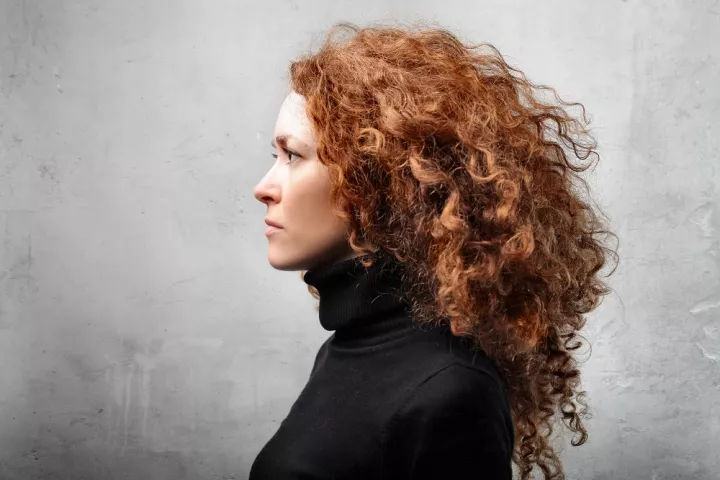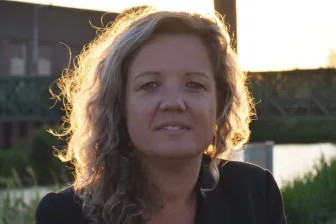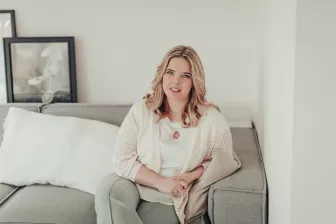Constantly feeling unsafe
“In my childhood, I was sexually abused by my father. I don’t remember how often and for how long, but I have enough unpleasant memories, and it went further than just touching my breasts. Discussing the details feels re-traumatizing to me. The consequences of the abuse and how it affected me are what matters to me.”
Hannah says it sometimes happened on Saturday morning, while her mother made breakfast downstairs. “I was aware that it wasn’t normal, and I also knew it was a secret and I wasn’t supposed to talk about it. He never said that out loud, but I could feel it.” There’s no doubt that the abuse and his actions were horrible, but the (lifelong) effects of it were even worse, according to Hannah. “The way it made me feel as a child was awful. Constantly feeling unsafe and stressed. Carrying a secret with you, which means you’re living in two different worlds.”
“I’ve felt very alone, I grew up in a family situation that wasn’t normal, when all I wanted was for it to be normal. By now, I’ve taken a lot of steps in the process, but it still costs me a lot of time and energy. While others just live their lives, which costs them energy, I always say – with the trauma I carry with me and the time I put into therapy next to my work and studies – that I have two jobs.”
Lonely
What’s brave is how Hannah stopped the abuse by herself while she was in elementary school. “At one point I refused him entry into my room. I remember very well how I put my leg forward and told him to go away. Thinking back to it, this felt like a moment of empowerment.” When Hannah was 18, she exposed the abuse with the help of her boyfriend at the time.
After Hannah exposed the sexual abuse, her mother stayed with her father. “When I was young, I rationalized this. I didn’t like it, but I didn’t do anything with that feeling. I wasn’t aware yet of how abandoned I felt. Again, I was forced to be tough, to just keep going and keep working like nothing was wrong. That felt very lonely.”
Resistance
It took a long time before Hannah ended up at Perspectief Herstelbemiddeling. After a long time of no contact with her parents, she slowly got back in touch. “It was hard. I only wanted contact with my mother, and I would talk to her while my father sat next to her. There were a lot of unspoken sentiments in the background that bothered me. As if, just because we talked about the abuse, it was all okay now? For me it wasn’t okay yet and I felt that there was no room for that. I quit the contact again and started searching.”
Hannah starts studying family constellations and wants her parents to go to therapy, but encounters resistance. She continues searching, but still isn’t exactly sure what she’s looking for. From webpage to webpage and through keyword searches she eventually found Perspectief Herstelbemiddeling. For Hannah it was clear what she wanted to get out of the mediation. “I’ve had to do a lot on my own and didn’t have a lot of support, when I really wanted support. I wanted someone –who is specialized in this- to help me think about what my wants and needs are, and how I can communicate them to my father and my mother.”
Recognition
Hannah wanted two conversations. A separate one with her father, and a separate one with her mother. “That was a dealbreaker for me. I think they are both responsible for their own part in it, and I don’t want them to hide behind each other. For a long time it felt like two against one. I also take my own responsibility as a victim and do what I can to heal and recover. It took me a lot of soul searching!” Hannah explains that the mediator was very helpful in the preparation process for the meetings. “I was given a lot of room to talk and found that very nice, especially because both me and my parents were treated with respect and without judgment.”
The conversation with her father went smoother than with her mother. “I got real recognition from my father. I could calmly tell him about what the abuse did to me, and what I wanted and needed. With sincerity, he tried to understand me and give me what I needed.” This touched Hannah and she got emotional. “I realize very well that many victims never get recognition that the sexual abuse even took place. Many offenders keep denying it, sometimes especially because they are being judged. I find it a sad thing. If you are already judged before you get a chance to explain your side of the story, I would try to hide as well.”
During the conversation with her mother, it was important for Hannah to stay true to herself. “My mother easily gets emotional and feels hurt. My pitfall is that I start taking care of the other person in those situations, when that’s exactly what I shouldn’t be doing. I wanted her to understand what I had needed and what the consequences had been. I received recognition for that, and I can clearly remember that the conversation felt like a tipping point. A moment in which we both realized that each of us had our own process and that we shouldn’t get caught up in each other’s process.”
‘We threw everything out on the table and the conversation created a lot of space for us. I no longer expect them to go to therapy, I can’t force them to. I’m very grateful for what they are able to give to me now.’
Hannah
“That piece of ‘hope’ often seems to be missing”
The mediated contact between Hannah and her parents helped her a lot. She now gets the space she needs, and her parents accept it when Hannah’s not doing so well for a while and doesn’t want to see them for some time. “We threw everything out on the table and the conversation created a lot of space for us. I no longer expect them to go to therapy, I can’t force them to. I’m very grateful for what they are able to give to me now. They support me in a practical way, for example by giving me meals to put in my freezer when I’m very busy with work, closing cases, or when I’m very fatigued.”
With such a fulfilling outcome, it’s not unexpected that Hannah also recommends restorative mediation to others. “I wish for everyone to be able to start their (restorative) process (together) and find empowerment. It’s a sad thing that sexual abuse cases (and other major crimes) are still so often framed in the context of fear. Don´t get me wrong; it’s cruel and it’s bad, at the same time it can also end this way. That piece of ‘hope’ often seems to be missing. You always remain the victim of an event, but there’s a difference between recognizing that you’re a victim, and always feeling like a victim and staying in that victim role. You are so much more than just a victim. It’s a part of your life. I also sometimes still cry on the couch, but I don’t have to keep a grudge for my entire life. That gives me the opportunity to live instead of survive and I’d like more attention to be given to that aspect.” One of Hannah’s inspirers is Holocaust-survivor Edith Eger.
Do you want to know more about whether restorative mediation is right for you or your client? We can help you.
Please contact us.



